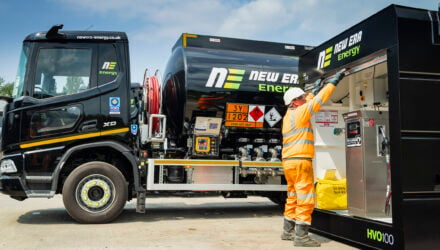The road transport industry is the backbone of the economy and plays an essential role in enabling people to live their daily lives. This was brought into sharp focus earlier this year during the driver shortages which had disastrous impacts on fuel and food supply, not to mention causing a host of wider supply chain issues.
A recent Road Haulage Association (RHA) survey of its members estimates there is still a shortage of more than 100,000 qualified drivers in the UK, so recruiting and retaining workers in the industry must be a priority for government and industry.
While it will take a variety of measures to remedy the problem, one thing is clear – worker retention has never been more important. With drivers calling for better working conditions to make the industry a more desirable place to work, taking action to improve drivers health and wellbeing is a good place to start.
Professional drivers are one of the most at-risk groups for work-related physical and mental health problems. Numerous research studies have linked professional drivers with an increased risk of cardiovascular disease, hypertension, back pain, chronic fatigue and coughs and colds. However, often overlooked, professional drivers also suffer from a host of serious mental health problems. One in four truck drivers will have mental health issues at some point over the course of a year and around a third of illnesses at work in the transport and logistics industry are due to mental ill-health. These numbers are also likely to be considerably higher with mental health reporting often underestimating the problem.
This is not only costly to the drivers and their families on a personal level but is also a major concern for fleet operators and the wider economy that rely on drivers to keep the economy going.
Mental health problems among workers are said to cost the UK between £70-100 billion per year, with work-related stress costing 10.4 million working days per year. So, addressing these issues – especially during these challenging times – will not only be hugely beneficial to individual drivers and their employers but will also positively impact the UK economy.
Air pollution – an invisible threat
Prolonged exposure to harmful air pollutants is exacerbating health problems for professional drivers. Professional drivers will often spend 50+ hours on the road every week, and air pollution has been found to be up to 10x higher inside vehicles than on the road, which negatively impacts alertness, productivity, accident rates, sick days and driver turnover.
Crucially, air pollution is also known to lead to a range of mental health problems. A recent study in London found that increases in the key air pollutants – PM2.5, NOx and NO2 – are associated with up to 39% increased odds of common mental disorders.
Air pollution has also been heavily linked to increased fatigue and loss of concentration. This is especially important for fleet drivers as fatigue is a factor in 20% of all collisions. Likewise, a report by the School of Public Health’s Environmental Research identified links between air pollution exposure and COVID-19 related hospitalisations. With COVID cases on the rise, it’s crucial that the situation isn’t exacerbated by harmful air pollution.
Earlier this year the World Health Organisation (WHO) reduced its thresholds on the levels of harmful air pollution on human health, following evidence that air pollution can negatively impact people’s health at even lower concentrations than previously understood. This means that drivers in almost all cities of the UK are routinely exposed to air pollution at far higher levels than the safe limits.
The role of technology
There are some simple but effective measures drivers can take to prevent exposure to air pollution. These include taking less congested routes, avoiding tunnels and managing shift rotation to reduce each driver’s exposure to peak traffic times. While these steps can help to reduce exposure, they are not always feasible and more must be done to ensure the protection of drivers.
At AirLabs, we have developed AirBubbl – a market-leading in-vehicle air cleaning device that creates a clean air-breathing zone in the drivers’ cabin, efficiently removing 99% of air pollutants and delivering a constant flow of clean air to the driver and others in the vehicle. The AirBubbl floods the vehicle with 38,000 litres of clean air every hour, removing harmful ozone gases, nitrogen dioxide (NO2) and ultrafine particle pollutants (PM10, PM2.5 and smaller). The devices have already been installed in a range of settings including taxis, fleet vehicles, public transport and private vehicles to provide an affordable and effective solution for protecting drivers and keeping them on the roads.
Time to take action
Professional drivers, whether they’re behind the wheel of HGVs, buses or private hire and taxi vehicles, are the industry’s key assets, moving people and goods where they need to be. To ensure the long-term sustainability of the industry, we must ensure professional drivers are protected against the health threats they face every day. Utilising technology solutions is a cleaner, smarter way of tackling the driver shortage crisis.
Author: Stuart Walker, Head of Product Marketing, Airlabs







